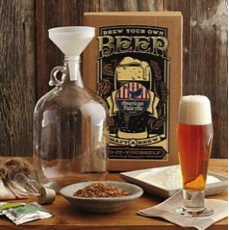 Today’s guest post comes from Blake Daniels, a stay-at-home dad with a passion for the simple things in life. You would most likely find him spending quality time with his family, brewing and enjoying beer or mowing the lawn.
Today’s guest post comes from Blake Daniels, a stay-at-home dad with a passion for the simple things in life. You would most likely find him spending quality time with his family, brewing and enjoying beer or mowing the lawn.

This newfound respect got me to try my hand at brewing my own beer. When I started, I assumed it would be difficult to match the quality of commercial brews, but it turns out that homebrewers everywhere produce high-quality, award-winning beers in their kitchens and garages using beginner-level equipment.
During my short time as a homebrewer I’ve learned some valuable lessons that might help you avoid a few rookie mistakes that I made.
Do Your Homework
After struggling to make it through my first brew day, I knew that if I didn’t take the time to learn more about the brewing process, I would end up dumping most of my beer (and money) down the drain. I found that the ‘must-read’ book for every homebrewer is The Complete Joy of Homebrewing by Charlie Papazian.

If you haven’t decided to start homebrewing yet, there are plenty of other reasons to do some beer-related reading. Checking out brewing books to learn how beer is made and the characteristics of different styles can enhance your beer-drinking experience and give you a greater overall appreciation for beer. There are also magazines like BeerAdvocate and DRAFT that are focused on the industry in general in case you just want to keep a pulse on the world of beer.
Start Off Small

Looking back I really wish that I had started off with a smaller one-gallon size kit that would have allowed me to get used to the brewing process before I stepped up to larger batches. Making smaller batches of beer also gives you the opportunity to express your creativity as a brewer. Another thing to keep in mind is that darker, roasty beers like a stout can hide some flaws, as can something like an overly hopped IPA. If you’re nervous about making beer, look into styles that give you wiggle room.
Don’t Go It Alone
The homebrewing community is probably the single-most important resource that you have as a homebrewer. If you have a problem, someone out there has already found a solution.

If you’re the DIY type but don’t know how to get started on your next project, a great place to go is Homebrew Talk. The site has a very active forum, with posts covering a near-endless amount of topics and also offers huge databases of projects. If you’re looking to find some brew-day inspiration, BeerSmith has a user-generated collection of over 100,000 recipes that guarantees you won’t have any trouble coming up with an idea for your next batch of beer.
If you’re just getting started with homebrewing, these tips should give you a solid foundation to build upon, but this is just the beginning. Take some time to tap into all of the information that’s available and you shouldn’t have any problems taking your brewing to the next level.
Thanks to Blake for offering up these tips! If you’re interested in collaborating on a blog post, contact me on Twitter.
+Bryan Roth
“Don’t drink to get drunk. Drink to enjoy life.” — Jack Kerouac

